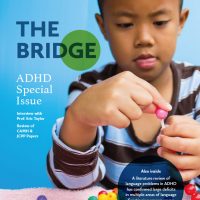Research digest
-

Barriers to sharing information with schools
A recent study by Tania Hart and Michelle O’Reilly has found that the exchange of information between Child and Adolescent Mental Health Services (CAMHS) and schools needs improving to sufficiently support the educational needs of young people with emotional mental health difficulties.
Read more -

Child & Adolescent Mental Health: Through a digital lens
Despite the significant increase, availability and usage of mobile devices by children and teenagers, there is still a lack of evidence to support their safety or effectiveness with vulnerable populations.
Read more -

-

iPad App complements ASD therapy
Children with autism spectrum condition (ASC) may benefit from combined technology-based and traditional interventions, according to new research.
Read more -

Digital health interventions for the young: meeting expectations?
The number of digital health interventions for mental health disorders is increasing, but research from Chris Hollis and colleagues suggests that the clinical benefits and cost-effectiveness are unclear. Consistent methods of reporting and evaluation are required to extract definitive conclusions from clinical trials.
Read more -

How research on cyberbullying has developed
Prof. Peter K. Smith, Goldsmiths, University of London, England
Read more
The topic of cyberbullying is often in the media, because of the distress and harm it can cause. There have been cases where it appears to have contributed significantly to tragic outcomes such as suicide (Livingstone & Smith, 2014). -

mHealth ineffective for depression prevention
A universal cognitive behavioural therapy (CBT)-based mobile messaging programme (MEMO CBT) designed to prevent teenage onset depression provides no clinical benefit, according to results of a double-blind, randomised, placebo-controlled trial.
Read more -

Parents with BD receive online support
The value of a unique interactive, web-based resource that provides psychoeducational and parenting information for patients with bipolar disorder (BD) and young children has been supported by promising results of a randomised, controlled pilot trial.
Read more -

Changing perceptions on technological therapy
Educating parents in computer-based therapies for youths with mental health disorders may improve uptake of this therapeutic modality by affected families.
Read more -
